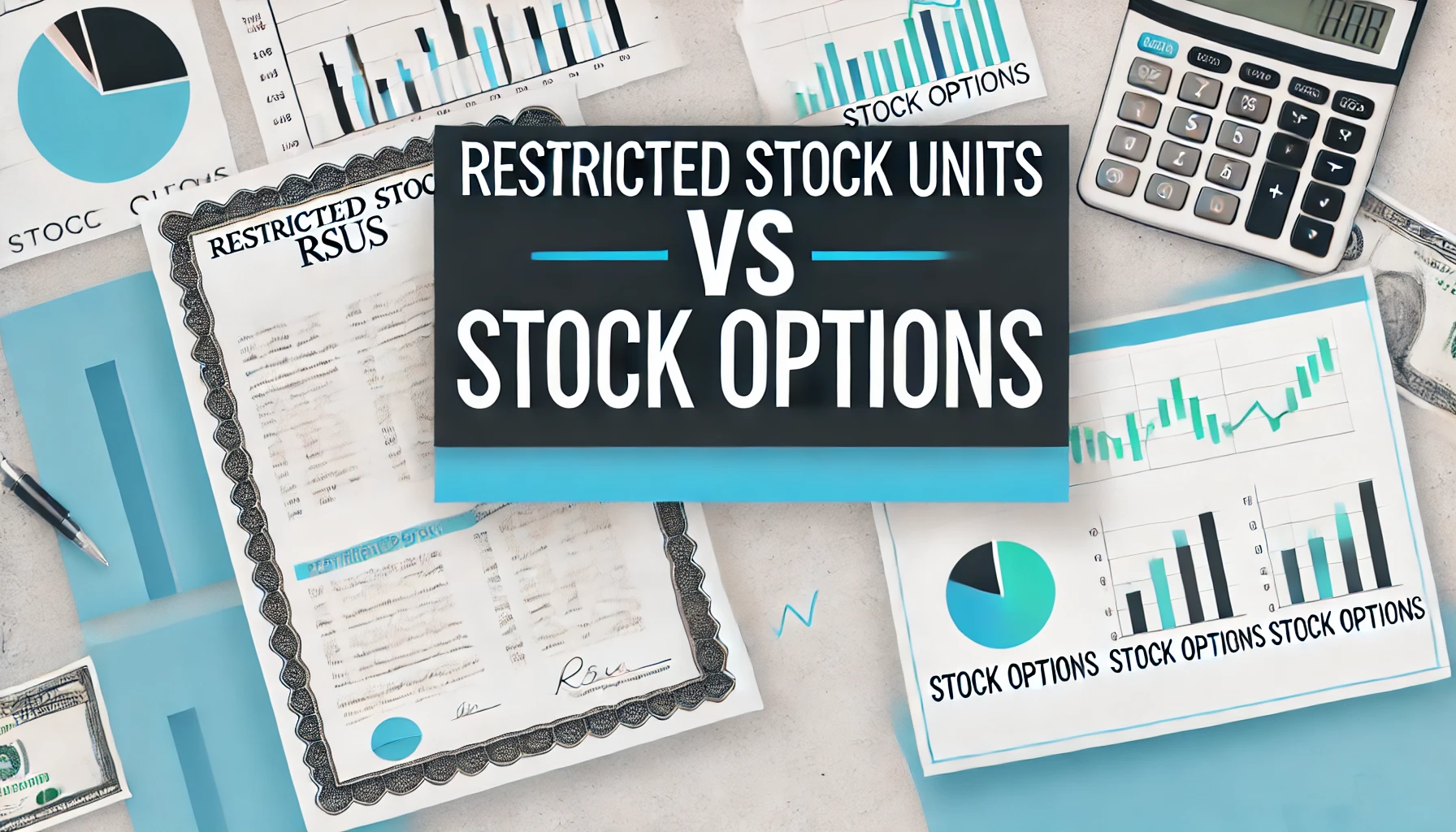Stock-based compensation is a popular way for companies to reward employees, align their interests with shareholders, and offer potential financial benefits in the long term. Two of the most common forms of stock-based compensation are Restricted Stock Units (RSUs) and Stock Options. While both offer opportunities to earn equity in a company, they work very differently, and each comes with its own set of advantages and disadvantages. This blog will explore the differences between RSUs and Stock Options and help you understand which option might be best for you.
1. What Are Restricted Stock Units (RSUs)?
Restricted Stock Units (RSUs) are a form of stock compensation that a company grants to its employees as part of their compensation package. Unlike stock options, RSUs are essentially company shares that are given to employees, but they come with restrictions on when they can be sold or transferred.
When a company grants RSUs, the shares are typically not immediately available to the employee. Instead, they vest over time, meaning the employee must fulfill certain conditions, such as working for the company for a specific number of years, before they can own and sell the shares.
- Vesting Schedule: RSUs typically vest according to a schedule, such as over four years, with a portion of the shares becoming available each year. For example, if an employee receives 100 RSUs with a four-year vesting schedule, 25 shares will vest at the end of each year. Once vested, the shares belong to the employee, who can sell them, hold onto them, or transfer them.
- No Purchase Requirement: Unlike stock options, RSUs do not require the employee to purchase the shares. Once they vest, the shares are owned by the employee outright.
- Taxation: RSUs are taxed as ordinary income when they vest. The value of the shares at the time of vesting is added to the employee’s taxable income. If the employee sells the shares later, any gains are subject to capital gains tax.
2. What Are Stock Options?
Stock options are another form of stock-based compensation that gives employees the right to purchase company shares at a predetermined price, known as the “exercise price” or “strike price,” after a certain period or upon meeting specific conditions.
Stock options do not automatically grant ownership of shares. Instead, the employee has the option to buy shares at a fixed price, which may be lower than the market price if the company’s stock has appreciated.
- Vesting Schedule: Like RSUs, stock options also vest over time. Once vested, employees can exercise their options to purchase shares at the strike price.
- Exercise Price: The strike price is the price at which employees can buy the shares. If the market price of the company’s stock is higher than the strike price, employees can purchase the shares at a discount and potentially sell them for a profit.
- Taxation: Stock options are taxed differently from RSUs. Employees are generally not taxed when the options are granted or vested. Taxes apply when the options are exercised and shares are sold. If the employee holds onto the shares after exercising the options, any gains are subject to capital gains tax.
3. Key Differences Between RSUs and Stock Options
Although both RSUs and stock options are used to incentivize employees, they differ in several ways. Below are the key differences between RSUs and stock options:
- Ownership: RSUs represent ownership in the company once the shares vest. Stock options, on the other hand, give the employee the option to buy shares in the future but do not guarantee ownership.
- Purchase Requirement: With RSUs, employees do not need to purchase the shares. Once they vest, the shares are owned outright. With stock options, employees must pay the exercise price to purchase the shares.
- Value at Vesting: RSUs always have value at the time of vesting because they are actual shares. Stock options, however, may be worthless if the market price is lower than the exercise price (a situation known as being “underwater”).
- Taxation: RSUs are taxed as ordinary income when they vest, based on the value of the shares at that time. Stock options are taxed when they are exercised, and capital gains tax may apply if the shares are sold later.
- Market Conditions: RSUs are less risky in terms of market conditions because they always have value at vesting, regardless of the stock price. Stock options, however, only have value if the company’s stock price exceeds the exercise price.
4. Advantages of RSUs
RSUs have several advantages for employees, especially those who prefer lower risk and certainty in their compensation:
- Guaranteed Value: Unlike stock options, which can lose value if the stock price declines, RSUs always have value when they vest. Employees receive shares without the need to make any purchase, making them a more secure form of compensation.
- Simplicity: RSUs are straightforward. Employees don’t need to worry about exercising options or calculating the right time to buy. Once the RSUs vest, the shares are theirs.
- Tax Deferral: Taxes are only due when the RSUs vest, giving employees a clear understanding of their tax obligations based on the value of the shares at the time of vesting.
- Less Risk: RSUs are less dependent on market conditions. Even if the company’s stock price falls, RSUs still provide the employee with shares at no cost.
5. Advantages of Stock Options
Stock options can provide greater financial upside potential if the company’s stock price appreciates significantly. Here are the main advantages of stock options:
- Potential for High Gains: If the company’s stock price rises significantly, stock options can result in a large financial gain for the employee. The difference between the strike price and the market price represents a profit that can be substantial.
- Flexibility: Employees have the flexibility to decide when to exercise their stock options. This can allow them to wait for favorable market conditions before making a decision.
- Lower Initial Cost: Employees are not required to purchase shares upfront. Instead, they have the option to buy shares at a later date, which can help manage cash flow.
- Tax Planning: Employees can plan the timing of their stock option exercises to manage tax liabilities. For example, they can choose to hold onto the shares after exercising the options to qualify for lower capital gains tax rates.
6. Disadvantages of RSUs
Despite their advantages, RSUs also have some potential drawbacks:
- Immediate Taxation at Vesting: RSUs are taxed as income when they vest, which means employees are subject to immediate tax liabilities based on the value of the shares. If the stock price later declines, employees may face a situation where they have paid taxes on a higher value than the current market price.
- Lack of Flexibility: Employees have no control over the timing of the vesting of RSUs. This lack of flexibility can be a disadvantage in managing tax obligations or market timing.
- Less Potential for High Gains: RSUs provide guaranteed value, but they may not offer the same upside potential as stock options, especially if the company experiences significant growth.
7. Disadvantages of Stock Options
Stock options come with their own set of risks and drawbacks:
- Risk of Expiring Worthless: If the company’s stock price does not rise above the strike price, stock options can expire worthless, leaving the employee with no financial gain.
- Market Dependency: Stock options are heavily dependent on market performance. If the company’s stock price declines, the options may become worthless or have very little value.
- Complex Tax Implications: Stock options can have complicated tax implications, especially if the employee exercises the options and holds onto the shares. Employees must carefully consider the tax consequences before exercising their options.
8. Which is Better: RSUs or Stock Options?
Choosing between RSUs and stock options depends on several factors, including the employee’s financial goals, risk tolerance, and the company’s growth potential. Here are a few considerations:
- Risk Tolerance: Employees with a low-risk tolerance may prefer RSUs because they provide guaranteed value at vesting. On the other hand, employees who are willing to take more risk in exchange for potential high rewards may prefer stock options.
- Company Growth: In companies with high growth potential, stock options can offer significant upside if the stock price rises above the strike price. RSUs, while providing guaranteed value, may not offer the same level of financial gain in such scenarios.
- Liquidity Needs: RSUs offer more immediate access to company shares without the need to spend money on exercising options. This can be advantageous for employees who need liquidity.
- Tax Planning: Employees who want more control over their tax situation may prefer stock options, as they can choose when to exercise the options and when to sell the shares.
9. Conclusion
Both Restricted Stock Units (RSUs) and Stock Options are valuable tools for employee compensation, but they serve different purposes and come with unique advantages and disadvantages. RSUs offer guaranteed value and simplicity, while stock options provide the potential for significant financial gains in high-growth companies. When deciding between RSUs and stock options, it’s important to consider your financial goals, risk tolerance, and the company’s outlook.
By understanding the key differences between these two forms of compensation, employees can make more informed decisions about which option aligns with their long-term financial strategy.







































